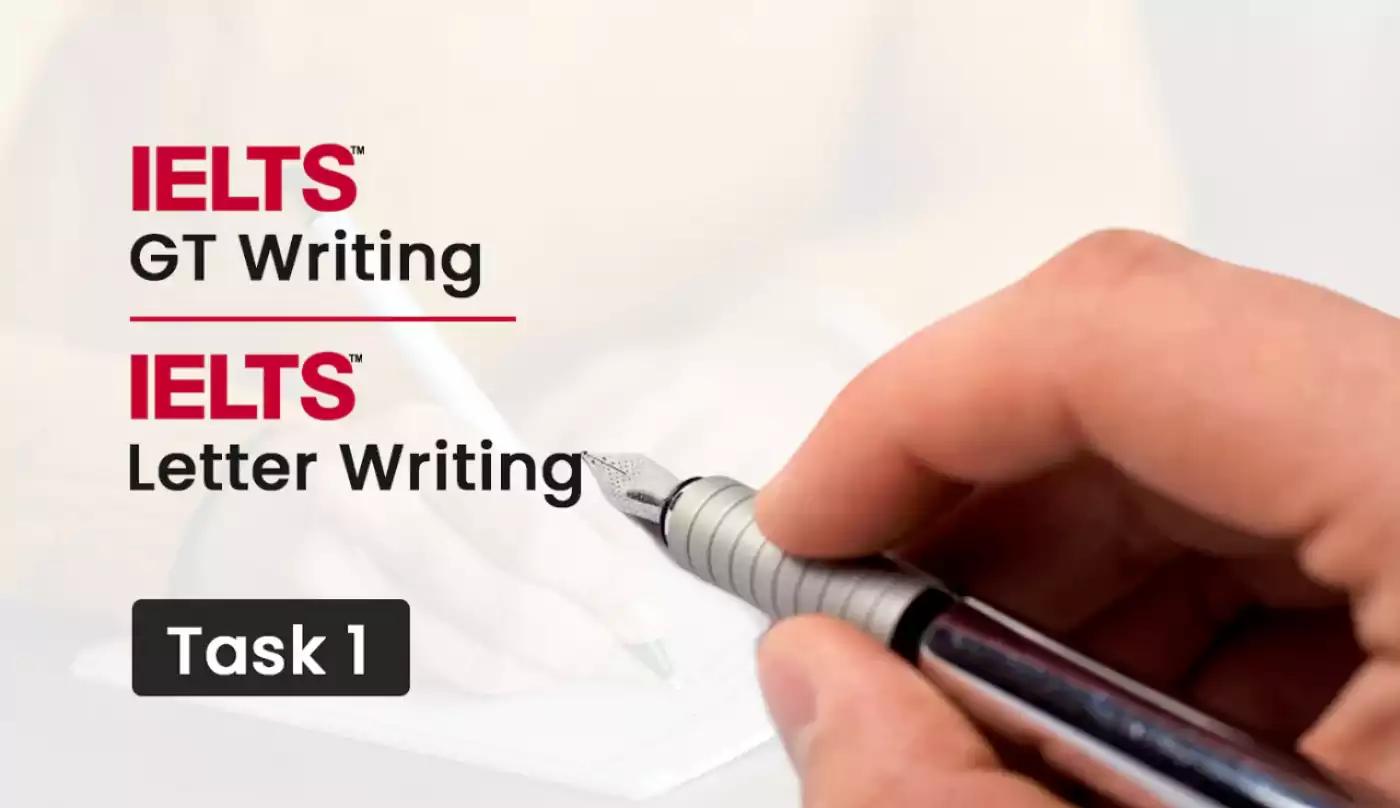• IELTS
IELTS GT Writing Task 1/ IELTS Letter Writing
5709 Reads
3 min Read
- General Training Writing Task 1 is one of the important sections of the IELTS test.
- Many students face challenges while preparing for IELTS GT writing task 1.
- Students should know the basics of forming and developing a letter if they want to score well in the letter-writing section.
- A clear expression and explanation in letter writing can help you secure a high band score.

The IELTS letter-writing section evaluates your everyday language use. It also checks your ability to integrate into an English-speaking culture. The IELTS Writing test has a time limit of 60 minutes, with 20 minutes for Task 1 and 40 minutes for Task 2. For IELTS Writing Task 1, you need to write a letter at least 150 words long. Depending on the situation, it could be a formal, informal, or personal letter.
Therefore, this blog will cover both fundamental and advanced letter-writing strategies for the IELTS. You will also learn which actions to take and which to avoid to improve your IELTS band score.
Grading Factors in IELTS Writing Task 1(Letter Writing)
Below are the factors on which a test taker or candidate is evaluated in IELTS Writing Task 1 (Letter Writing) :
| Task Achievement | In IELTS, the scores are given based on a band scale ranging from 0-9. Similarly, you are graded based on your letter's length, relevance, and tone. The length of your content must be at most 150, but it is not a good sign if you write too much. Also, clearly state the letter's purpose if you want a high band score on the IELTS test. However, Task achievement is 25% of the total score for Task 1. You must address all parts of the prompt. |
| Grammatical Range and Accuracy | Write simple sentences in your answers to improve your grammatical range and accuracy. However, most students use the present continuous tense and make mistakes with articles, prepositions, and subject-verb agreement. In addition, instead of using complex sentences, write simple and short sentences to make your answers easy to read. |
| Lexical Resource | Lexical resource is the ability to use a wide range of vocabulary correctly without grammatical errors. Also, the use of lexical resources should be appropriate in your answers. The goal here is to have a good enough vocabulary to properly paraphrase the information you see in the IELTS Academic Writing Task 1 and Task 2 prompts. Therefore, you must choose words that are relevant to the topic and include them in your sentences. However, what's surprising is that you can get a good band score using unusual but correct lexical phrases. |
| Coherence and Cohesion | Coherence and Cohesion are essential for both Task 1 and Task 2. Coherence is how well you connect ideas in a logical order. On the other hand, Cohesion is when you use words like "and," "but," and "this" to tie sentences together. However, your writing should flow naturally and not be distracting. |
Also read: IELTS Exam dates
Useful Tips for IELTS Writing Task 1(Letter Writing)
- Dear ..... (Salutation)
- Paragraph 1: Purpose – why are you writing
- Paragraph 2: Write about 1st bullet point
- Paragraph 3: Write about 2nd bullet point
- Paragraph 4: Write about 3rd bullet point
- Signoff
IELTS Formal Letter
In IELTS Writing Task 1, formal letter writing topics can be divided into ten categories:
- A Complaint Letter :
- A Request Letter
- A Review Letter
- A Feedback Letter
- A Resignation Letter
- An Application Letter
- An Apology Letter
- An Arrangement Letter
- An Explanation Letter
- An Invitation Letter
Also read: IELTS test centres
IELTS Informal Letter
Informal letter-writing topics are more challenging to organise when writing to a friend than formal letter topics due to the many options available. The letter addresses social and individual circumstances.
An example of Informal letter writing would be:
Please write a letter inviting your friend to your wedding. In your letter:
- Tell your friend about your wedding and explain why their being at your wedding is important for you.
- Suggest that they stay with you at your place.
Remember, when writing an informal letter, start with a friendly opening paragraph. Before getting to the main point of your letter, it's important first to acknowledge your friendship. The opening sentence can be a brief, friendly conversation, not necessarily related to the main topic of your letter.
Also read: IELTS test fee
IELTS Semi-Formal Letter
A semi-formal letter is a letter you write to someone you know in a formal context, even though the difference between formal and informal letters is clear.
For example:
Your Neighbours use loudspeakers, and that disturbs you. Write a complaint letter to the secretary of the society. In your letter:
- Tell them that your Neighbours are bothering you with the loudspeakers
- Explain the whole situation to your secretary
- Ask for the secretary's help by intervening in the situation
Also read: IELTS Registration
How to Score High in IELTS Letter Writing
| Determine the Letter's Type | Identify the types of letters: Formal, Informal, or Semi-formal. |
| Select an Appropriate Tone and Remain with It | The tone depends on the type of letter. |
| Compile Your Letter Using the Common Essay Format | The format must be clear and organized. You can use the standard essay format. |
| Write Clearly and Concisely | You should write clearly and concisely, keeping the word limit 150 in mind. |
| Use Imagination, but Stay Realistic | Remember to carefully analyze the situation and use information that is easy to understand. Any differences can confuse the reader. |
| Respond to Every Part of the Questions | You should read each question and plan how to address it carefully. Since each question is unique, it's impossible to memorize all questions. Instead, study each question thoroughly before taking action. |
| Contractions and Informal Letters | Use contractions when writing an informal letter. However, task 2 and professional or semi-formal letters should not utilize contractions. |
| Grammar | When writing, consider your audience and their needs. Include important information first and use short, direct sentences. Use simple, everyday language and active voice for clarity. |
| Modal Verbs | Modal verbs are words that make phrases sound less direct and more formal. |
| Everyday Language | The General Training test encourages using everyday language and simple letters with ordinary words. Regardless of the tone, the letters should be conversational. |
Conclusion
Also read: IELTS exam pattern
FAQ
Get great articles direct to your inbox
The latest news, articles, and resources, sent straight to your inbox every month.
Popular Universities to Study Abroad
World class education waiting for you.
-London.webp)
Glasgow Caledonian University (London)
England, UK • 32 Programmes
Tuition Fee : GBP 12000-14000 / year

Education Centre of Australia (ECA) Group - Higher Education Leadership Institute - Melbourne Campus
Victoria, Australia • 3 Programmes
Tuition Fee : AUD 0-0 / year

Montana State University - Bozeman
Montana, USA • 163 Programmes
Tuition Fee : USD 28000-28200 / year


Shorelight Group - Hartwick College
New York, USA • 40 Programmes
Tuition Fee : USD 21500-22000 / year

.png)
Waikato Institute of Technology (Wintec) - Rotokauri Campus
Hamilton, New Zealand • 15 Programmes
Tuition Fee : NZD 19105-23445 / year

BPP North America - Rose-Hulman Institute of Technology
Indiana, USA • 18 Programmes
Tuition Fee : USD 50000-51000 / year
Popular English Language Proficiency Exams
IELTS Online
- Live Classes
Blogs and Articles
Curated content to keep you updated on the latest education trends, news and more.
Updated on • Jul 17,2025 05:33 PM IST • USA
PTE Accepted Universities in Australia
Updated on • Jul 17,2025 05:09 PM IST • PTE
Part-Time Jobs for International Students in Australia
Updated on • Jul 17,2025 03:44 PM IST • Australia
Updated on • Jul 12,2025 04:02 PM IST • USA
Updated on • Jul 11,2025 11:32 AM IST • Education
CPT vs OPT: Meaning, Difference, and How to Apply
Updated on • Jul 11,2025 10:40 AM IST • USA
Masters in Computer Science in UK: Top Colleges, Eligibility, Scholarships
Updated on • Jul 10,2025 11:29 AM IST • study in the UK
Highest Paying Jobs in the World
Updated on • Jul 08,2025 01:40 PM IST • Study Abroad
MBA in Australia for Indian Students: Best Universities, Requirements, Scholarship, Courses, Jobs
Updated on • Jul 08,2025 01:35 PM IST • Australia
Canada vs Australia: Which Country is Better for Indian Students in 2025?
Updated on • Jul 07,2025 12:46 PM IST • Education
France vs Germany: Which Is Better for International Students?
Updated on • Jun 30,2025 05:15 PM IST • Education
Top 10 Agricultural Universities in USA
Updated on • Jun 27,2025 05:25 PM IST • USA
Most In-Demand Future Careers in 2025
Updated on • Jun 26,2025 04:41 PM IST • Education
How Much Do Nurses Make in the U.S.?
Updated on • Jun 23,2025 03:59 PM IST • USA
Updated on • Jun 21,2025 02:00 PM IST • USA
MBA in UK: Universities, Eligibility, Types, and Career Opportunities
Updated on • Jun 19,2025 04:09 PM IST • UK • study in the UK
Scholarships in France for Indian Students
Updated on • May 29,2025 05:22 PM IST • France
Intakes in Dubai for Indian Students
Updated on • May 27,2025 03:34 PM IST • Study in Dubai
France Student Visa 2025 – Requirements, Fees, Checklist & Application Process
Updated on • May 23,2025 03:36 PM IST • France
MBA in France for Indian Students in 2025
Updated on • May 22,2025 05:35 PM IST • France
Related Blogs and Articles
A little effort to provide an authentic and reliable content for keen readers!!
Updated on • 11-04-2025 • IELTS
Describe Your Hometown IELTS Speaking Part 1 Topic
Updated on • 07-04-2025 • IELTS
PTE vs IELTS : Know the Difference and Which is Easier?
Updated on • 21-03-2025 • IELTS
IELTS Exam Dates 2025 in India
Updated on • 18-01-2025 • IELTS
IELTS Reading Practice Tests 2025: Reading Passage and Sample Questions
Updated on • 15-01-2025 • IELTS
IELTS Letter Writing Topics 2025
Updated on • 15-01-2025 • IELTS
Canada IELTS band requirements 2025
Updated on • 10-01-2025 • IELTS
Updated on • 25-11-2024 • IELTS
Updated on • 21-11-2024 • IELTS
Updated on • 02-11-2024 • IELTS
Linking Words for IELTS Speaking - Word List & Tips
Updated on • 25-10-2024 • IELTS
IELTS Writing Task 2 - Academic and General Topics with Sample Answer
Updated on • 25-10-2024 • IELTS
IELTS Writing Task 2: Tips, Lessons & Models
Updated on • 25-10-2024 • IELTS
IELTS Test Report Form (TRF): Number, Tracking, Validity and Sample
Updated on • 25-10-2024 • IELTS
IELTS Speaking Samples and Answers
Updated on • 25-10-2024 • IELTS
Updated on • 25-10-2024 • IELTS
Updated on • 25-10-2024 • IELTS
IELTS Sample Charts for Writing Task 1 Practice
Updated on • 25-10-2024 • IELTS
Updated on • 25-10-2024 • IELTS
How many times is the IELTS exam conducted in a year?
Updated on • 25-10-2024 • IELTS















